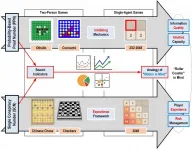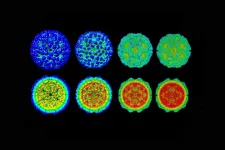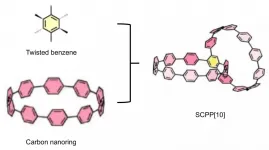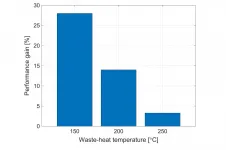(Press-News.org) Iahikawa, Japan - Humans benefit from playing games more than some might realize. Games can be a relaxed approach to learning or honing our problem-solving skills while relieving stress. However, game playing generally carries a considerable amount of decision-making, involving mathematical and statistical considerations that we make to decide on what we think is the best move. Thus, games showcase many of the impressive faculties and inner workings of the human brain, which in turns makes them a great testbed and playground for research on artificial intelligence (AI).
One aspect common to many games is decision making based on uncertain information about current and potential future game states. Experienced players can 'look ahead' from the current state of a game and analyze what could happen several turns or moves down the line, allowing them to strategize accordingly. Most notably, this mental process is akin to what some search algorithms are designed to do--not just for game solving, but also in general computing tasks across various areas of application. But how do we establish a formal connection between these fields?
At the Japan Advanced Institute of Science and Technology (JAIST), Professor Hiroyuki Iida's research group is developing new theories to analyze and ultimately understand the many facets of games and game playing, both from purely objective and psychological points of view. In their latest study published in IEEE Access Prof. Iida, alongside first author of the paper Anggina Primanita and Mohd Nor Akmal Khalid, also from JAIST, attempted to bridge computing notions with the experience of game playing. To do this, they proposed two indicators to be used in search tree algorithms--the probability-based proof number (PPN) and the single conspiracy number (SCN)--and applied them to various turn-based games.
These search indicators are values that search tree algorithms calculate to 'assess' their progress towards a desired objective. When playing a game, for example, an AI based on a search algorithm would use search indicators to analyze potential future states while looking mainly for plays that somehow maximize the chances of winning. Ultimately, search indicators and algorithms should be crafted carefully to minimize computing resources used; not every possible play has to be considered in detail, but only those that are likely to win.
The researchers applied these two indicators in search tree frameworks in the context of different games, including Chess, Chinese Chess, Connect 4, Othello, and 2048. The results revealed interesting information on what each indicator brings to the table. "The PPN-based search provided a means for determining the quality of information available in the game and seemed to operate in a similar fashion to human intuition. Contrarily, the SCN-based search provided a platform to understand the player's experience and how they manage risks when taking decisions," explains Prof. Iida.
Additionally, the SCN-based search approach was linked with another theoretical framework developed at Iida's lab: the concept of motion in mind. This approach analyzes various objective and subjective aspects of the game-playing experience in a mathematical fashion by drawing analogies with motion-related concepts from physics, such as those in classical mechanics. By comparing the SCN with these analogies of motion in games, the researchers found that the underlying computations are directly related to the oscillations (from losing to winning positions) that happen in both single-player and two-player competitive games.
Both search approaches analyzed in this study have applications in and outside the realm of games. For example, PPN can be used to save valuable resources and time during intensive computing tasks, such as optimization problems, planning, scheduling, and simulations. Meanwhile, the SCN is useful in contexts where high-stakes decisions must be made or when long-term planning is necessary, as it allows for optimizing values and minimizing risks. "Both PPN and SCN can be crucial components for research in the field of artificial intelligence, including evolutionary computations and high-performance computing," remarks Prof. Iida, "Moreover, they both provide stepping stones for measuring entertainment from an information science point of view."
Further multidisciplinary studies shall help us find more links between entertainment, information science, and the human mind. Hopefully, in the long run, we will be able to tailor games from a more subjective and even purpose-driven perspective, maximizing our enjoyment while being useful in many other ways.
INFORMATION:
Reference
Title of original paper: "Computing Games: Bridging The Gap Between Search and Entertainment"
Journal: IEEE Access
DOI: 10.1109/ACCESS.2021.3079356
About Japan Advanced Institute of Science and Technology, Japan
Founded in 1990 in Ishikawa prefecture, the Japan Advanced Institute of Science and Technology (JAIST) was the first independent national graduate school in Japan. Now, after 30 years of steady progress, JAIST has become one of Japan's top-ranking universities. JAIST counts with multiple satellite campuses and strives to foster capable leaders with a state-of-the-art education system where diversity is key; about 40% of its alumni are international students. The university has a unique style of graduate education based on a carefully designed coursework-oriented curriculum to ensure that its students have a solid foundation on which to carry out cutting-edge research. JAIST also works closely both with local and overseas communities by promoting industry-academia collaborative research.
About Professor Hiroyuki Iida from Japan Advanced Institute of Science and Technology, Japan
Dr. Hiroyuki Iida received his Ph.D. in 1994 on Heuristic Theories on Game-Tree Search from the Tokyo University of Agriculture and Technology, Japan. Since 2005, he has been a Professor at JAIST, where he is also Trustee and Vice President of Educational and Student Affairs. He is the head of the Iida laboratory and has published over 300 hundred papers, presentations, and books. His current research interests include artificial intelligence, game informatics, game theory, mathematical modeling, search algorithms, game-refinement theory, game tree search, and entertainment science.
Funding information
This study was funded by a grant from the Japan Society for the Promotion of Science in the framework of the Grant-in-Aid for Challenging Exploratory Research (Grant Number: 19K22893).
Months after recovering from mild cases of COVID-19, people still have immune cells in their body pumping out antibodies against the virus that causes COVID-19, according to a study from researchers at Washington University School of Medicine in St. Louis. Such cells could persist for a lifetime, churning out antibodies all the while.
The findings, published May 24 in the journal Nature, suggest that mild cases of COVID-19 leave those infected with lasting antibody protection and that repeated bouts of illness are likely to be uncommon.
"Last fall, there were reports that antibodies wane quickly after infection with the virus that causes COVID-19, and mainstream media interpreted that to mean that immunity was not long-lived," said senior author Ali Ellebedy, PhD, an associate professor ...
A critical process in the infection cycle of viruses has been revealed for the first time in dynamic detail using pioneering plant-based technology.
Evidence about the process of virus maturation revealed in the research could help us develop new methods for treating viral infections.
Maturation plays a critical role for all animal and bacterial viruses and is required to produce infectious virions or particles. Though the outlines of the process have been determined for many groups of viruses, detailed mechanistic studies have not been reported.
To provide the first detailed mechanistic study of maturation, Roger Castells-Graells, ...
The research team led by Prof. DU Pingwu from the University of Science and Technology of China (USTC) of the Chinese Academy of Sciences (CAS) first successfully synthesized an all-phenylene bismacrocycle (bis- means two) with Siamese-twin structure and used fullerene as guest molecules to assemble a peanut-shaped supramolecular complex. This study was published in Angewandte Chemie.
As a new type of carbon material, carbon nanotubes (CNTs) have attracted widespread attention because of their outstanding mechanical and photophysical properties. However, the synthesis of CNTs or CNTs fragments with selective simple structure is still a challenge.
This study reported a conjugated highly strained all-phenylene Siamese-twin bismacrocycle, SCPP[10]. Two phenylene nanorings, [10]CPP, conjoined ...
Research co-led by Newcastle University has shed new light on important microscopic scale interactions between algae and bacteria predicated on the mutually beneficial exchange of nutrients.
The research was carried out at the University of Cambridge and the Nordsim laboratory at the Swedish Museum of Natural History in Stockholm by Dr Hannah Laeverenz Schlogelhofer, now at the University of Exeter, and a team led by Dr Ottavio Croze, of Newcastle University's School of Mathematics, Statistics and Physics.
They have used an advanced high-spatial resolution isotope mapping technique called 'SIMS' (secondary ion mass spectrometry) to chart for the first time how long it takes for labelled carbon produced by microalgae to be transferred ...
A supersensitised brain connection has been identified in people who suffer from misophonia, an extreme reaction to "trigger" sounds.
For the first time, researchers led by Newcastle University, have discovered increased connectivity in the brain between the auditory cortex and the motor control areas related to the face, mouth and throat.
Publishing today, in the Journal of Neuroscience, lead author Dr Sukhbinder Kumar, Newcastle University Research Fellow in the Biosciences Institute said: "Our findings indicate that for people with misophonia there is abnormal communication between the auditory and motor ...
Posts to Reddit forum "SuicideWatch" spike in the early hours of Monday morning
New research from the Institute of Psychiatry, Psychology & Neuroscience (IoPPN) at King's College London has found that people on a social media suicide support forum are most likely to post to the site during the early hours of Monday morning.
The study, which has been published in BMC Psychiatry, suggests that there is a clear variation in behaviour throughout the week and throughout the day. The researchers hope that this means that targeted support to at risk populations can be made more readily available to those most in need.
The researchers looked at the timings at which users of the Reddit ...
The study, published in the journal Nature Aging and led by the laboratories of Dr. Alberto Pascual (CSIC), from the Neuronal Maintenance Mechanisms Group, and Prof. Javier Vitorica (University of Seville/CIBERNED) of the Physiopathology of Alzheimer's Disease Group at IBiS, demonstrates for the first time that low oxygen levels in the so-called senile plaques in the brain reduces the immune system's defensive capacity against the disease.
The study also suggests that this lack of oxygen in the brain enhances the action of disorders associated with Alzheimer's disease that are characterised by low systemic oxygen levels, such as atherosclerosis and other cardiovascular diseases.
What happens ...
Forensic archaeologists and anthropologists from Cranfield University have started to recover the bodies of victims executed by the Franco regime at the end of the Spanish Civil War during an excavation in the Ciudad Real region of Spain.
The team from Cranfield is working with partners from the University Complutense of Madrid (UCM) and social anthropologists from Mapas de Memoria (Maps of Memory) to search for, exhume and identify those executed and buried in the civil cemetery at Almagro between 1939 and 1940.
Several bodies with gunshot wounds to the head, personal effects and parts of clothing ...
For many diseases, overweight and obesity are risk factors. But now a study shows that a higher BMI may be linked to higher survival rates in patients hospitalized for severe bacterial infections.
Scientists at Sahlgrenska Academy, University of Gothenburg, and Skaraborg Hospital in Skövde carried out the research, and their study has now been published in the journal PLOS ONE. The data were collected before the COVID-19 pandemic.
The population-based study involved observations, over a nine-month period, of all 2,196 individual adults receiving care for suspected severe bacterial ...
In his most recent published research, appearing in Applied Thermal Engineering, City, University of London's Dr Martin White explores a novel organic Rankine cycle system, based on a two-phase expansion through numerical simulations of the system.
His paper, Cycle and turbine optimisation for an ORC operating with two-phase expansion, considers the use of modern fluids whose properties could help to mitigate concerns around turbine damage, whilst allowing the benefits of two-phase expansion to be realised.
Waste heat from a range of industries, ranging from iron and steel to food and drink, ...






